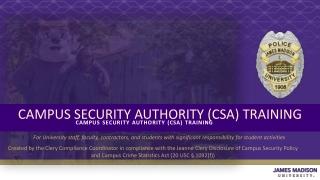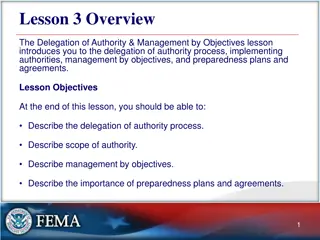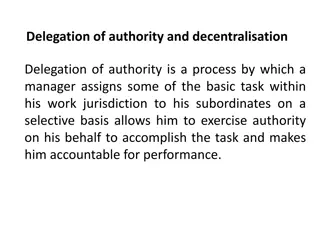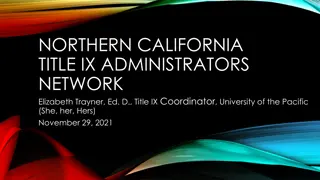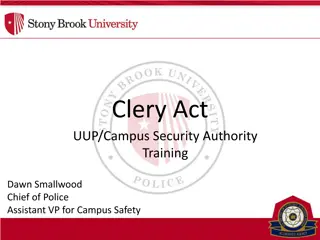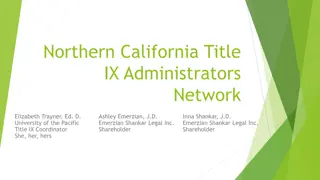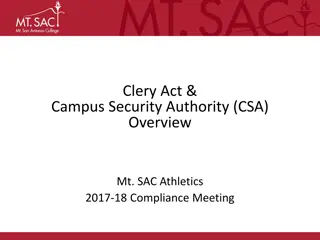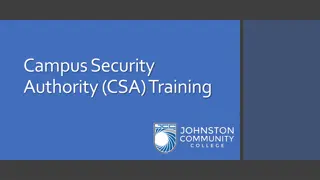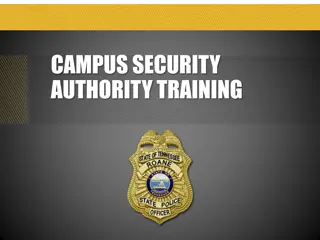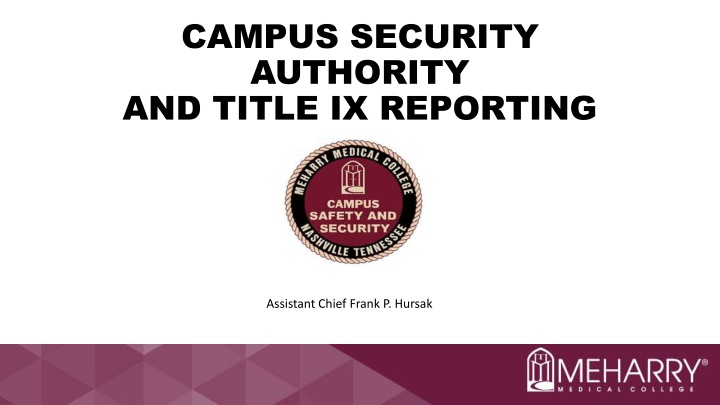
Importance of Campus Security Authorities and the Clery Act
Discover the significance of Campus Security Authorities (CSAs) and the Clery Act in promoting campus safety. Learn about their roles, reporting requirements, and the impact on crime prevention. Stay informed to ensure a secure campus environment.
Download Presentation

Please find below an Image/Link to download the presentation.
The content on the website is provided AS IS for your information and personal use only. It may not be sold, licensed, or shared on other websites without obtaining consent from the author. If you encounter any issues during the download, it is possible that the publisher has removed the file from their server.
You are allowed to download the files provided on this website for personal or commercial use, subject to the condition that they are used lawfully. All files are the property of their respective owners.
The content on the website is provided AS IS for your information and personal use only. It may not be sold, licensed, or shared on other websites without obtaining consent from the author.
E N D
Presentation Transcript
CAMPUS SECURITY AUTHORITY AND TITLE IX REPORTING Assistant Chief Frank P. Hursak March 2020
CLERY ACT HISTORY Named in memory of 19-year-old Lehigh University freshman, Jeanne Ann Clery, who was tragically raped and murdered in her residence hall room on April 5, 1986. Her parents believed she and others would have been more cautious if they d known about other violent crimes at Lehigh University. 1990 Federal Law enacted: Crime Awareness and Campus Security Act amended the Higher Education Act (HEA) of 1965). 1998 Renamed Jeanne Clery Disclosure of Campus Security Policy and Campus Crime Statistics Act (i.e., the CleryAct ).
IMPACT OF THE CLERY ACT Mandated a requirement for all colleges and universities that participate in federal financial aid programs to keep and disclose information about crime on and near their respective campuses.
SO WHY IS THIS IMPORTANT TO YOU? The Clery Act requires institutions to collect crime reports from individuals and organizations that have been identified as campus security authorities . Crime data is collected from many areas that have been identified as Campus Security Authorities.
WHO ARE CAMPUS SECURITY AUTHORITIES (CSA) The Clery Act defines four categories of Campus Security Authorities (CSAs) Campus Police or Security Non-police campus security, such as monitoring access to a building or parking area, escorting students around campus, or providing security at an event or location housed or rented by the College Individuals or departments specified within institutional policy to which students and employees should report criminal offenses Any official who has significant responsibility for student and campus activities. (i.e. student housing, student conduct, athletics, Greek affairs, etc.)
ROLE OF CAMPUS SECURITY AUTHORITIES (CSAs) Not all crimes are reported directly to the Department of Campus Safety & Security. Therefore, to comply with the Clery Act, we require a collaborative effort to gather previously unreported crime statistics from all individuals and organizations affiliated with the college who have significant responsibilities for student or campus activities.
SO AS A CSA, WHAT IS YOUR RESPONSIBILITY To report crimes and allegations of crimes reported in good faith Good faith means you have a reasonable basis to believe the crime occurred. Simply report the facts on a Meharry Campus Security Authority Crime Report Form. When in doubt, ALWAYS REPORT!
HOW TO SUBMIT A CSA REPORT? Visit https://home.mmc.edu/ Click Campus and Security on the bottom of the page Click the Clery Act Reporting link. Select the 'CSA Reportable Crime Reporting: Click here' option.
WHAT DO YOU REPORT? When and where the crime or alleged crime occurred. When it was reported to you and date it occurred. Narrative describing what occurred within the incident. Victims can make anonymous reports. Explain to victim you have an obligation to report the information even if they choose to remain anonymous.
HOW SHOULD I HANDLE THE CRIME DISCLOSURE? CSAs are not responsible for determining authoritatively whether a crime took place, and they should not try to apprehend alleged suspects of crimes. When interacting with a person reporting a crime, CSAs should do the following: Explain their obligation to report the incident to DCSS Gather enough information that would provide sufficient detail to properly classify the incident Offer the person available support resources (a listing of available support resources):
RESOURCES Title IX Coordinator Office: Office of the General Counsel: 615.327.6552 or 615.327.6921 Registrar s Office/Student Services: 615.327.6806 Office of Human Resources: 615.327.6336 Support Resources: Campus Security: 615.327.6254 Counseling Services and Office of the Chaplain: 615.327.6975 Meharry Medical College Hotline Number: 1.888.695.1534 Metro Nashville Police - Domestic Violence Unit: 615.880-3000 (8am-10pm) and 615.862.8600 (after 10pm) Tennessee Domestic Violence Hotline: 1-800-356-6767 YWCA Crisis and Information Line: (615) 242-1199 or toll-free 1-800-334-4628.
MEHARRY CAMPUS SECURITY AUTHORITY CRIME REPORT FORM CSA Form Header: Meharry Medical College CAMPUS SECURITY AUTHORITY CRIME REPORT FORM Please forward this completed form to: CLERY Compliance, 1005 Dr. D.B. Todd Jr. Blvd, Nashville, TN, 37208 and Email Address: CLERYACT@mmc.edu
MEHARRY CAMPUS SECURITY AUTHORITY CRIME REPORT FORM CSA Form Section 1:
MEHARRY CAMPUS SECURITY AUTHORITY CRIME REPORT FORM CSA Form Section 2:
CLERY ACT LAW DEFINITIONS CSA Form Section 3: Burglary: The unlawful entry of a structure to commit a felony or a theft. For reporting purposes this definition includes: unlawful entry with intent to commit a larceny or a felony; breaking and entering with intent to commit a larceny; housebreaking; safecracking; and all attempts to commit any of the aforementioned. Motor Vehicle Theft: The theft or attempted theft of a motor vehicle. (Classify as motor vehicle theft all cases where automobiles are taken by persons not having lawful access, even though the vehicles are later abandoned - including joy riding) Arson: The willful or malicious burning or attempt to burn, with or without intent to defraud, a dwelling house, public building, motor vehicle or aircraft, or personal property of another kind. Domestic Violence: The term domestic violence includes felony or misdemeanor crimes of violence committed by a current or former spouse of the victim, by a person with whom the victim shares a child in common, by a person who is cohabitating with or has cohabitated with the victim as a spouse, by a person similarly situated to a spouse of the victim under the domestic or family violence laws of the jurisdiction receiving grant monies, or by any other person against an adult or youth victim who is protected from that person s acts under the domestic or family violence laws of the jurisdiction. Crimes and Offenses (Title 39) This title covers a wide range of criminal offenses including theft, assault, and more. Specific chapters within this title address different types of crimes. Example: TCA 39-13-101 defines assault. Criminal Procedure (Title 40) This title addresses procedures related to criminal prosecutions, including arrest, bail, trial procedures, and sentencing. Example: TCA 40-11-101 discusses bail and recognizance.
CLERY ACT LAW DEFINITIONS CSA Form Section 3: Family Violence (Title 36, Chapter 3) This chapter specifically deals with domestic relations and includes statutes on orders of protection and other measures to address family violence. Example: TCA 36-3-601 et seq. provides definitions and procedures for orders of protection. Dating Violence: The term dating violence means violence committed by a person (A) who is or has been in a social relationship of a romantic or intimate nature with the victim; and (B) where the existence of such a relationship shall be determined based on a consideration of the following factors:(i) The length of the relationship; (ii) The type of relationship; (iii) The frequency of interaction between the persons involved in the relationship. Stalking: The term stalking means engaging in a course of conduct directed at a specific person that would cause a reasonable person to (A) fear for his or her safety or the safety of others; or (B) suffer substantial emotional distress. Weapon Law Violations: The violation of laws or ordinances dealing with weapon offenses, regulatory in nature, such as: manufacture, sale, or possession of deadly weapons; carrying deadly weapons, concealed or openly; furnishing deadly weapons to minors; aliens possessing deadly weapons; all attempts to commit any of the aforementioned. Drug Abuse Violations: Violations of state and local laws relating to the unlawful possession, sale, use, growing, manufacturing, and making of narcotic drugs. The relevant substances include: opium or cocaine and their derivatives (morphine, heroin, codeine); marijuana; synthetic narcotics (Demerol, methadones); and dangerous non-narcotic drugs (barbiturates, Benzedrine). Liquor Law Violations: The violation of laws or ordinance prohibiting: the manufacture, sale, transporting, furnishing, possessing of intoxicating liquor; maintaining unlawful drinking places; bootlegging; operating a still; furnishing liquor to minor or intemperate person; using a vehicle for illegal transportation of liquor; drinking on a train or public conveyance; all attempts to commit any of the aforementioned. (Drunkenness and driving under the influence are not included in this definition.)
CLERY ACT LAW DEFINITIONS CSA Form Section 3: Sex Offenses: Rape: Penetration, no matter how slight, of the vagina or anus with any body part or object, or oral penetration by a sex organ of another person, without the consent of the victim. This definition includes any gender of victim or perpetrator. Fondling: The touching of the private body parts of another person for the purpose of sexual gratification, forcibly and/or against that person s will; or, not forcibly or against the person s will where the victim is incapable of giving consent because of his/her youth or because of his/her temporary or permanent mental incapacity. Incest: Nonforcible sexual intercourse between persons who are related to each other within the degrees wherein marriage is prohibited by law. Statutory Rape: Nonforcible sexual intercourse with a person who is under the statutory age of consent. Hate Crimes: Meharry Medical College is also required to report statistics for hate (bias) related crimes by the type of bias as defined below for the following classifications: murder/non-negligent manslaughter, sex offenses, robbery, aggravated assault, burglary, motor vehicle theft, arson (see definitions above) and larceny, vandalism, intimidation, and simple assault (see definitions below).
CLERY ACT LAW DEFINITIONS CSA Form Section 3: Larceny: The unlawful taking, carrying, leading, or riding away of property from the possession or constructive possession of another. Vandalism: To willfully or maliciously destroy, injure, disfigure, or deface any public or private property, real or personal, without the consent of the owner or person having custody or control by cutting, tearing, breaking, marking, painting, drawing, covering with filth, or any other such means as may be specified by local law. Intimidation: To unlawfully place another person in reasonable fear of bodily harm through the use of threatening words and/or other conduct, but without displaying a weapon or subjecting the victim to actual physical attack. Simple Assault: An unlawful physical attack by one person upon another where neither the offender displays a weapon, nor the victim suffers obvious severe or aggravated bodily injury involving apparent broken bones, loss of teeth, possible internal injury, severe laceration or loss of consciousness. If a hate crime occurs where there is an incident involving intimidation, destruction/damage/vandalism of property, larceny/theft, simple assault, the law requires that the statistic be reported as a hate crime even though there is no requirement to report the crime classification in any other area of the compliance document. A hate or bias related crime is not a separate, distinct crime, but is the commission of a criminal offense which was motivated by the offender's bias. For example, a subject assaults a victim, which is a crime. If the facts of the case indicate that the offender was motivated to commit the offense because of his bias against the victim's race, sexual orientation, etc... the assault is then also classified as a hate/bias crime.
CLERY ACT LAW DEFINITIONS CSA Form Section 4:
CLERY ACT CRIMES Hate Crimes- All Clery crimes and any incidents of Larceny/Theft, Simple Assaults, Intimidation, Vandalism that were motivated by bias: Race Gender Religion Sexual Orientation Ethnicity Disability National Origin Gender Identity Arrests and Referrals Liquor Law Violations Drug Violations Weapon Law Violations Murder/non-negligent manslaughter Negligent Manslaughter Sex Offenses - Forcible Rape, Fondling, Sodomy, VAWA Sex Offenses Non-forcible Incest, Statutory Rape Robbery Aggravated Assault Burglary Motor Vehicle Theft Arson Domestic Violence Dating Violence Stalking
CSA TRAINING IN ONE SENTENCE You have been designated as a Campus Security Authority(CSA); this means if you witness, learn of, or hear about a Clery Act crime, you must, as soon as possible, contact the Meharry Medical College Department of Campus Safety & Security and tell them what happened, when it happened, and where it happened; you may identify the victim or keep the victim s identity confidential.
What is Title IX Title IX of the Education Amendments of 1972 protects people from discrimination based on sex in education programs or activities that receive financial assistance. Discrimination based on sex includes sexual harassment and all types of sexual violence, including rape, sexual assault, sexual battery, sexual abuse, and sexual coercion.
Title IX Reportable Incidents Persons are protected from sex-based discrimination, regardless of their real or perceived sex, gender identity, and/or gender expression Verbal, non-verbal or physical aggression Intimidation Hostility based on sex or sex-stereotyping Warning signs of sexual harassment or sexual violence may include students or employees reporting or appearing to be Upset Anxious Embarrassed Vulnerable Unsafe A single or isolated incident, such as rape, may create a hostile environment.
MEHARRY MEDICAL COLLEGE RESPONSIBILITIES Title IX protects students from sexual harassment / sexual violence by any MMC employee, another student, or non-employee third party. MMC is obligated under Title IX to take immediate and appropriate action to investigate and determine what occurred once the school has notice of possible sexual violence. If sexual violence / harassment has occurred, MMC is obligated to do the following even if there is not a criminal investigation: Take prompt and effective steps to end the behavior and interim measures to protect the complainant prior to the final outcome of the investigation. Use the preponderance of evidence standard (51%) to resolve complaints. Meharry Medical College is in violation of TITLE IX if it has notice of a sexually hostile environment and fails to take immediate and corrective action.
REPORTING FOR RESPONSIBLE EMPLOYEES Responsible employees include any employee who: Has the authority to take action to redress the harassment Has the duty to report to appropriate school officials sexual harassment / sexual violence or any other misconduct by students or employees A student could reasonably believe has this authority or responsibility As a responsible employee at MMC you have the duty to: Report criminal or non-criminal incidents of sexual harassment or sexual violence Notify the complainant of their right to file a Criminal complaint Title IX complaint
Title IX reporters cannot guarantee confidentiality to a victim of a sexual violence / sexual harassment. Confidential Resources- Psychological and Counseling Center Clergy or pastoral counselor, acting in that role Medical provider acting in a patient care role Student Health Center Employee Assistance Program Faculty and Physician Wellness Program Nurse Wellness Program All reports of criminal and non-criminal incidents are to be communicated to the College Title IX Coordinator, who is responsible for investigating complaints of sexual misconduct in a timely manner. Title IX Coordinator Equal Opportunity or Office Equity and Inclusion.

